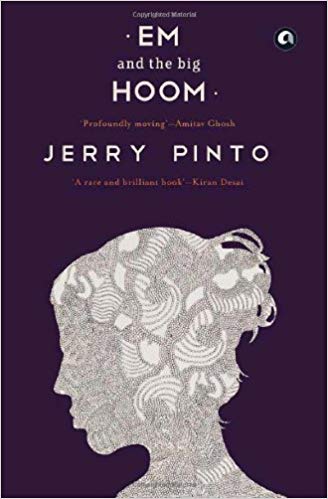
Em and the Big Hoom
A Novel
کتاب های مرتبط
- اطلاعات
- نقد و بررسی
- دیدگاه کاربران
نقد و بررسی

May 26, 2014
Pinto’s debut offers a heartbreaking glimpse into the daily horrors and sometimes humors of growing up with a mentally ill parent. Set in India, the story is told through the eyes of an unnamed son looking back on childhood with his always tumultuous mother, Imelda, aka “Em,” and her casual cruelties, unpredictable public scenes, suicide attempts, and psychiatric stays. The narrator does his journalistic best, investigating his mother’s old letters, her diary, and interrogating the snide, quipping Em as much as she’ll allow, to determine how she even met his stalwart father, Augustine, aka “the Big Hoom”—let alone how they came to start a family together. The narrator also hopes to find out exactly how Em lost her mind. Even in her many betrayals, Em is charming; the narrator’s depiction of her is unflinching and honest, and relayed in a tidy voice that’s nearly matter-of-fact. The result is a trim but deeply felt first novel that successfully navigates some difficult territory—identity, madness, our obligations to one another—without ever becoming bogged down.

June 15, 2014
Home is where your mother is. But what if she's mad? That's the reality facing a teenage son in this mordant debut about a troubled Indian family.Opening scene: Ward 33 (Psychiatric). The unnamed narrator, in his late teens, is visiting his mother, Em; his father, unaccountably, is the Big Hoom. (The childhood names have stuck.) Em is in the hospital every few months. How did it all begin? She was fine giving birth to his big sister, Susan, but after the boy, postpartum depression ballooned into manic-depressive disorder, with a streak of paranoia. Then the suicide attempts began. The second one was especially rough on the kids; they discovered her in the bathroom, swimming in blood. When Em is in a manic phase, her conversation is wild, raunchy, funny and malicious as she free-associates. "A rough, rude, roistering woman," says her son. Rather than mother and son, they are two equals sparring, the son interrogating her with a prosecutor's sharpness. He has his reasons; his greatest fear is that he'll inherit her madness. Their conversations are the heart of the novel. Susan and the Big Hoom are sidelined. The latter is the perfect foil to Em: The straight man, stiff upper lip, solid as a rock but dull; Em has sucked up all the oxygen. Even the son gets short shrift as the schoolboy, presto changeo, becomes a journalist. Pinto could also have provided more context. Flashbacks to the couple's life before Em's breakdown are poorly integrated. The family lives in Bombay in a miserably cramped apartment, though the Big Hoom makes good money as a salesman; their social class and ethnicity are left fuzzy.More clarity would have been welcome. Em's a star, but she can't support a whole novel.
COPYRIGHT(2014) Kirkus Reviews, ALL RIGHTS RESERVED.

July 1, 2014
Pinto's engaging debut, ripe with wit and affection, portrays an unforgettable family of four in middle-class, Catholic Mumbai as their lives revolve around their manic-depressive matriarch, Em. Em's son pieces together the story of her girlhood, career, courtship, and marriage to the Big Hoom, his stoic father, and her slide into mental illness. This dynamic picture of a complicated woman is crafted through diary entries, love letters, and conversations with the sharp-tongued Em, which are like wandering in a town you had never seen before, where every path you took might change course midway and take you with it. The narrator and his sister grow, under the weight of their mother's embarrassing manic episodes and terrifying depressions, from adolescents unable to sleep into adults wavering between guilt and concern over their potential to fall ill. Em's unpredictable states are humorous as much as harrowing, and despite her tendency to declare her loathing of motherhood, we feel her love for her children, even as we know that love and humor are not enough to combat her tragic illness.(Reprinted with permission of Booklist, copyright 2014, American Library Association.)

























دیدگاه کاربران